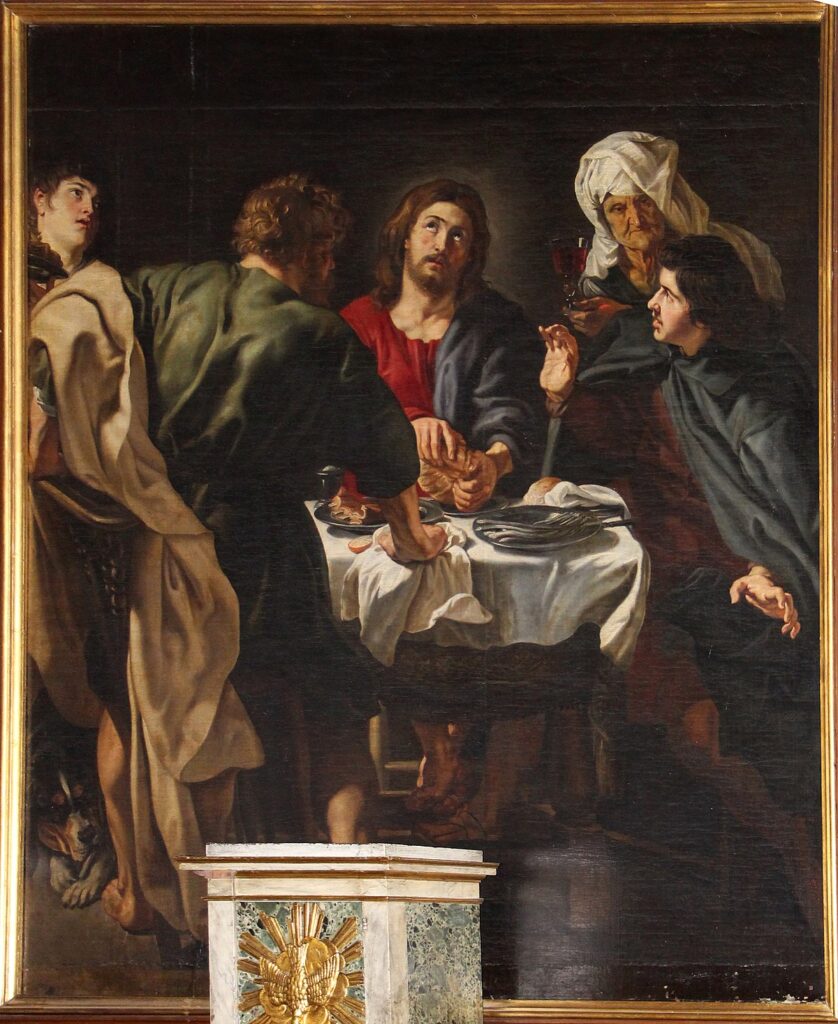Note: If you wish to receive, via e-mail, (1) my weekly newsletter or (2) daily copies of these posts, notify me at rrbates1951@gmail.com and indicate which you would like. I promise not to share your e-mail address with anyone. To unsubscribe, send me a follow-up email.
Spiritual Sunday
Today’s Gospel reading—which Julia and I hope to hear read in Coventry Cathedral—involves two of the disciples unknowingly encountering the risen Jesus as they walk the road to Emmaus. Among other things, he asks, “Was it not necessary that the Messiah should suffer these things and then enter into his glory?” Enthralled with his talk, they invite him to join them for supper, at which point he makes himself known:
So he went in to stay with them. When he was at the table with them, he took bread, blessed and broke it, and gave it to them. Then their eyes were opened, and they recognized him; and he vanished from their sight. They said to each other, “Were not our hearts burning within us while he was talking to us on the road, while he was opening the scriptures to us?” That same hour they got up and returned to Jerusalem; and they found the eleven and their companions gathered together. They were saying, “The Lord has risen indeed, and he has appeared to Simon!” Then they told what had happened on the road, and how he had been made known to them in the breaking of the bread.
The physicality of the risen Jesus, emphasized by his breaking and sharing the bread, is critical to Denise Levertov. In this she seems to agree with Dostoevsky’s Grand Inquisitor, who (as I noted in last Sunday’s post), disagrees with Jesus for his declaration, “Have you believed because you have seen me? Blessed are those who have not seen and yet have come to believe.” Dostoevsky’s Grand Inquisitor tells Jesus he is setting impossibly high standards and not accounting for human weakness.
Thou didst hope that man, following Thee, would cling to God and not ask for a miracle. But Thou didst not know that when man rejects miracle he rejects God too; for man seeks not so much God as the miraculous.
Levertov does not altogether say that she needs to witness miracle, but she’s unwilling to see Jesus’s resurrection as merely a metaphor for soul awakening. In her eyes, metaphors, which ground an abstract idea in a concrete reality, are not in themselves enough. As she puts it, she can’t open herself “to symbol’s power” unless she is
convinced of its ground,
its roots
in bone and blood.
We must feel
the pulse in the wound
to believe
that “with God
all things
are possible”…
In this she differs from those “intricate minds” that can be nourished entirely on concept, just as epiphytes (think Spanish moss) derive their moisture from moisture and nutrients in the air rather than from the plants they are attached to. Resurrection for them, she suggests, is an “internal power,” not “a matter of flesh.”
I must acknowledge to being somewhat agnostic here. Sometimes I believe that Jesus came back to life after being dead in some non-ghostly form, sometimes that the story is just a symbolic way of illustrating the power of love. I don’t see myself so much as one of Levertov’s intricate minds as someone who waffles on the subject.
Levertov seems to say that this is not enough for her. As one of the “literalists of the imagination,” she needs to believe that people actually tasted
bread at Emmaus
that warm hands
broke and blessed.
Here’s the poem:
On Belief in the Physical Resurrection of Jesus
By Denise Levertov
It is for all
‘literalists of the imagination,’
poets or not,
that miracle
is possible and essential.
Are some intricate minds
nourished on concept,
as epiphytes flourish
high in the canopy?
Can they
subsist on the light,
on the half
of metaphor that’s not
grounded in dust, grit,
heavy
carnal clay?
Do signs contain and utter,
for them
all the reality
that they need? Resurrection, for them,
an internal power, but not
a matter of flesh?
For the others,
of whom I am one,
miracles (ultimate need, bread
of life,) are miracles just because
people so tuned
to the humdrum laws:
gravity, mortality-
can’t open
to symbol’s power
unless convinced of its ground,
its roots
in bone and blood.
We must feel
the pulse in the wound
to believe
that ‘with God
all things
are possible,’
taste
bread at Emmaus
that warm hands
broke and blessed.


